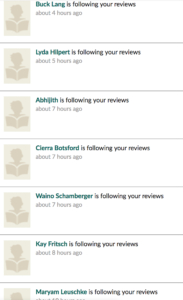Disclosure: I may earn affiliate revenue or commissions if you purchase products from links on my website. The prospect of compensation does not influence what I write about or how my posts are structured. The vast majority of articles on my website do not contain any affiliate links.
In January of last year, I reached one hundred followers on Goodreads. I was excited at the prospect of having my work recognized, though hesitant to assign significance to the number while unsure of how active and legitimate these users were. A year before that, in January 2017, I had roughly eight followers. Today, I reached 1000. What the hell is going on?
I’ve written about 200 reviews and have rated an additional 80 books that I haven’t yet written reviews for. The majority of my reviews have coincided with my reading 52 books a year for the last several years. After reaching 100 followers, I began putting more time into writing reviews even as I spent less time reading. As I crossed the five hundred mark, I started doing a little more research on where my followers were coming from.
While I do have the most popular reviews for a few high-trafficked books, such as Blood, Sweat, and Pixels, I suspect that a huge percentage of the followers I’ve gained over the last year, especially over the last two months, are fake accounts. Specifically, these accounts seem to be an outside attempt by a Chinese “pay for like” service to sell fake book ratings.
What tipped me off? Well, first, book people aren’t particularly social, but book people on a book social networking site tend to be incredibly social (though activity is often cyclical with finishing books and finding new books to read). As my followers grew, there was an uptick in likes on my reviews and recent activity, but virtually no additional comments or messages. After a while, I also noticed that my new followers arrived at odd times (often overnight) and had plausible but, in aggregate, ridiculous western names.

When investigating the profiles further, I discovered that the majority of these accounts are registered in China. The majority meaning 95% over the last month. Why not just come up with fake US zipcodes and hide the Chinese origin–I have no idea. But, in what world would all of these people with names like these live in China, create their accounts near the same time, and decide to follow me without much other activity? I’m guessing they are following me the mastermind behind the operation decided that my account seems legitimate. Maybe he really liked one of my reviews! In any case, to take a few genuine actions before using the account to sell fake book ratings makes sense.
What has shocked me so far is that none of these accounts appear to be being used for illicit activity yet. I can’t help but wonder about the scale here. You have to complete a CAPTCHA when registering multiple accounts (I just tried), so I am positive that these are manual account creations. It’s now a question of how they’re going to be used and whether I’m just a lucky recipient or if this is happening to dozens of other accounts on Goodreads as well (for what it’s worth, I’m nowhere near a top user on the site).
So, rather than patting myself on the back, it seems we’ve got a real mystery on our hands. Over the next few months, I’ll continue to monitor the situation and try to reach a better conclusion. And I’ll keep writing reviews.




